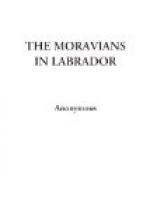[Footnote B: Vide “Moravians in Greenland.”]
[Footnote C: Pitt’s Bay and St. Louis Bay are creeks quite in the neighbourhood of Chateau Bay, or York’s Harbour.]
[Footnote D: Silla in Greenlandish, signifies sometimes the air, sometimes the understanding, and sometimes the world, or the +pneuma+, the soul of the world.]
[Footnote E: A poetical expression for pistols and muskets.]
CHAPTER II.
Contests between the Colonists and Savages revive—Murderous
skirmish.—Mikak.—Karpik,
his conversion and death.—The
Moravians receive a grant of land
on the coast of
Labrador—resolve to renew
the mission—voyage to explore the
land.—Jans Haven, Drachart,
&c., arrive at Labrador—their
interview with the natives—meet
Mikak and Tuglavina—their
kindness.—Segulliak the
sorcerer.—Anxiety of the Esquimaux for
their remaining among them—ground
purchased for a
settlement—manner of
bargaining with the Esquimaux—sail for
Esquimaux bay—the natives
troublesome—the Captain’s method of
checking them—conduct
of the missionaries—they preach on
shore.—Conversation with
the Esquimaux—search out a place for
a settlement—purchase
it of the natives—ceremonies used on the
occasion—take formal
possession.—Deputation return to England.
Various impediments prevented any further negociations with the government of Great Britain, in regard to establishing a mission among the Esquimaux, for nearly five years. During this period the English merchants and the natives on the coast of Labrador were anew involved in strife and bloodshed. With the missionaries all confidence had left the country; the colonists had no check, and the savages had no friend. The mercenary views of the traders were ever leading them to cheat and deceive these poor untutored unprotected beings, who in return, deemed retaliation no crime; nor in balancing the amount of guilt would it be easy to settle which of the parties were most deeply implicated; the one who gave trifles, or worse—beads or brandy, for articles of real value; or the other, who secretly pilfered some useless toys or iron implements, for which in fact they had greatly overpaid. Both were rogues in their dealings, only the Europeans had the advantage of superior knowledge, which enabled them to rob with superior dexterity, and to cloak their knavery under the name of barter.
But at this date—1766-9—the Esquimaux, from their intercourse with their civilized neighbours, had learned to estimate the value of European arms and vessels, and they stuck at no method by which they might possess themselves of them, while the murders which the whites committed with impunity, led them on every occasion that offered, eagerly to gratify their cupidity and revenge. They accordingly watched their opportunity; and in 1768, when the Europeans




